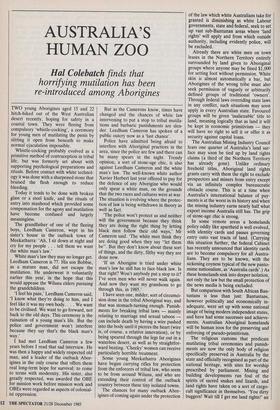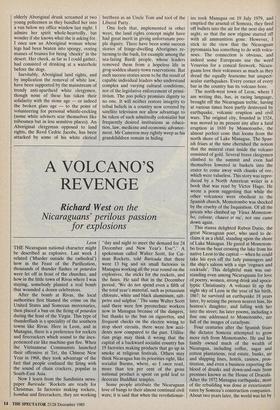AUSTRALIA'S HUMAN ZOO
Hal Colebatch finds that
horrifying mutilation has been re-introduced among Aborigines
TWO young Aborigines aged 15 and 22 hitch-hiked out of the West Australian desert recently, hoping for safety in a coastal town. They were fleeing from compulsory 'whistle-cocking', a ceremony for young men of mutilating the penis by slitting it open from beneath to make normal ejaculation impossible.
Whistle-cocking probably evolved as a primitive method of contraception in tribal life, but was formerly set about with supporting psychological preparations and rituals. Before contact with white technol- ogy it was done with a sharpened stone that bruised the flesh enough to reduce bleeding.
Today it tends to be done with broken glass or a steel knife, and the rituals of entry into manhood which provided some compensation for the agony and mutilation have become confused and largely meaningless.
The grandfather of one of the fleeing boys, Leedham Cameron, wept in his sister's house in the outback town of Meekatharra: `Ah, I sit down at night and cry for my people . . tell them we want the white man's law.'
White man's law they may no longer get. Leedham Cameron is 77. His son Bobbie, as a mature man, did not escape the mutilation. He underwent it voluntarily earlier this year, in the hope that this would appease the Wiluna elders pursuing the grandchildren.
`I feel his pain,' Leedham Cameron said, `I know what they're doing to him, and I feel like it was my own body. . . . We want to be civilised. We want to go forward, not back to the old days. This ceremony is the ruination of a young man's life. But the police and government won't interfere because they say that's the black man's way.'
I had met Leedham Cameron a few years before I read that sad interview. He was then a happy and widely respected old man, and a leader of the outback Abor- igines in the only course that offers them real long-term hope for survival: to come to terms with modernity. His sister, also greatly respected, was awarded the OBE for mission work before mission work and OBEs were regarded as aspects of colonial- ist oppression.
But as the Camerons know, times have changed and the chances of white law intervening to put a stop to tribal mutila- tions and barbaric punishments are slen- der. Leedham Cameron has spoken of a public outcry now as a 'last chance'.
Police have admitted being afraid to interfere with Aboriginal practices in the area, since the police are few and there can be many spears in the night. Trendy opinion, a sort of stone-age chic, is also against Leedham Cameron and the white man's law. The well-known white author Xavier Herbert last year offered to pay for the defence of any Aborigine who would only spear a white man, on the grounds that the two races and cultures were at war. The situation is evolving where the protec- tion of law is being withdrawn in theory as well as fact.
`The police won't protect us and neither will the government because they think they are doing the right thing by letting black men follow their old ways,' Mr Cameron said. 'The white men think they are doing good when they say "let them be". But they don't know about these sort of things, and the dirty, filthy way they are done now.
'If an Aborigine is tried under white man's law he still has to face black law. Is that right? Won't anybody put a stop to it? I've seen men who will never walk again. And now they want my grandsons to go through this, in 1985.'
I have seen one, milder, sort of circumci- sion done in the tribal Aboriginal way, and that was stomach-turning enough. Punish- ments for breaking tribal laws — mainly relating to marriage and sexual taboos can include death by having a wire pushed into the body until it pierces the heart (wire is, of course, a relative innovation), or by being speared through the legs far out in a waterless desert, as well as by straightfor- ward beating. 'Cheeky' women can receive particularly horrible treatment.
Some young Meekatharra Aborigines have begun carrying rifles for protection from the enforcers of tribal law, who seem to be from around Wiluna, and who are extending their control of the outback country between these tiny isolated towns.
The chances for many outback Abor- igines of coming again under the protection of the law which white Australians take for granted is diminishing as white Labour governments, state and federal, seek to set up vast sub-Bantustan areas where land rights' will apply and from which outside authority, including evidently police, will be excluded.
Already there are white men on town leases in the Northern Territory entirely surrounded by land given to Aboriginal groups where anyone may be fined $1,000 for setting foot without permission. White skin is almost automatically a bar, but Aborigines of the wrong tribe must also seek permission of vaguely or arbitrarily defined groups of traditional 'owners'. Through federal laws overriding state laws in any conflict, such situations may soon apply in every Australian state. Favoured groups will be given 'inalienable' title to land, meaning logically that as land it will be kept in economic primitivism — they will have no right to sell it or offer it as security against capital loans.
The Australian Mining Industry Council fears one quarter of Australia's land sur- face may soon be tied up by land rights claims (a third of the Northern Territory has already gone). Unlike ordinary freehold titles, Aboriginal land rights grants carry with them the right to exclude prospectors and miners from entry except via an infinitely complex bureaucratic obstacle course. This is at a time when Australia's international balance of pay- ments is at the worst in its history and when the mining industry earns nearly half what export income Australia still has. The grip of stone-age chic is strong.
In some remote areas a homelands policy oddly like apartheid is well evolved, with identity cards and passes governing entry onto vast tracts of land. (Carrying this situation further, the federal Cabinet has recently announced that identity cards are to become compulsory for all Austra- lians. They are to be known, with the sickening coyness typical of the new panto- mime nationalism, as 'Australia cards'.) As these homelands sink into deeper isolation, not only the law but the small protection of the news media is being excluded.
But comparison with South African Ban- tustans is less than just: Bantustans, however politically and economically in- adequate, were set up with some national image of being modern independent states, and have had some successes and achieve- ments. Australian Aboriginal homelands will be human zoos for the preserving and enforcing of pseudo-primitivism.
The religious customs that predicate mutilating tribal ceremonies and punish- ments are now the only body of religion specifically preserved in Australia by the state and officially recognised as part of the national heritage, with sites for worship prescribed by parliament. Mining and building developments run foul of the spirits of sacred snakes and lizards, and land rights have taken on a sort of cargo- cult significance in themselves. 'You dirty buggers! Wait till I get me land rights!' an elderly Aboriginal drunk screamed at two young policemen as they bundled her into a van below my office window last night. I admire her spirit whole-heartedly, but wonder if she knows what she is asking for. I once saw an Aboriginal woman whose legs had been beaten into spongy, oozing masses of bruises for being 'cheeky' in the desert. Her cheek, as far as I could gather, had consisted of drinking at a waterhole before the dogs.
Inevitably, Aboriginal land rights, and by implication the removal of white law, have been supported by the mainstream of trendy anti-apartheid white clergymen, though none of these has taken their solidarity with the stone age — or indeed the broken glass age — to the point of volunteering for personal whistle-cocking (some white advisers scar themselves like tribesmen but in less sensitive places). An Aboriginal clergyman opposed to land rights, the Revd Cedric Jacobs, has been attacked by some of his white clerical brethren as an Uncle Tom and tool of the Liberal Party.
One feels that, implemented in other ways, the land rights concept might have had great' merit in giving unfortunate peo- ple dignity. There have been some success stories of fringe-dwelling Aborigines re- turning to the bush, for example among the sea-faring Bardi people, whose leaders removed them from a hopeless life in grog-sodden shanty-town reservations. But such success stories seem to be the result of capable individual leaders who understand complex and varying cultural conditions, not of the legislative enforcement of primi- tivism. The zoo policy promises dignity to no one. It will neither restore integrity to tribal beliefs in a country now covered by satellite television nor allow advantage to be taken of such admittedly colonialist but frequently desired institutions as educa- tion, law, medicine and economic advance- ment. Mr Cameron may rightly weep as his grandchildren remain in hiding.



















































































 Previous page
Previous page